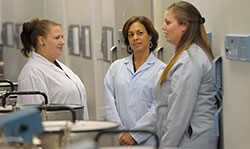 Samples from a prominent Coriell Biorepository collection are driving a federally backed commercial effort to help standardize whole-genome-based genetic testing.
Samples from a prominent Coriell Biorepository collection are driving a federally backed commercial effort to help standardize whole-genome-based genetic testing.
In response to the trending clinical application of next-generation sequencing, the demand for industry-wide regulatory guidelines has become more imperative than ever.
As such, the National Institute of Standards and Technology (NIST), a government organization designed to administer measurement science and technology developments, has harnessed DNA samples prepared by Coriell Institute to serve as the world's first genetic reference material for human genome sequencing.
For researchers studying and pursuing cures to complex human diseases and for clinical labs sequencing patients' genomes for healthcare decisions, the accuracy and reliability of data is crucial.
However, because genome sequencing technology advances so quickly and is regularly in flux, laboratories around the world have struggled to achieve consistency with results.
With this newly available resource, which was established using a cell line from the NIGMS Human Genetic Cell Repository at Coriell, which is sponsored by the National Institute of General Medical Sciences, NIST aims to alleviate the variability that can occur lab-to-lab by providing researchers with a well-characterized DNA point of reference.
To create this powerful tool, Coriell provided NIST with a large amount of high-quality DNA. In order to prepare for this large-scale production - approximately 25 times bigger than a typical production size - Coriell expanded a well-characterized cell line and subsequently harvested the cells for high-yield DNA isolation and quality control testing.
"By virtue of our gold-standard biobanking program and our expertise in the area of precision medicine, Coriell was naturally a great fit to facilitate this NIST project," says Dr. Dorit Berlin, Coriell's Director of Biobanking.
"The NIGMS Repository at Coriell represents more than 890 unique human diseases and equips a large portion of the international research community with valuable biospecimens," says Dr. Berlin.
"Ensuring that the most progressive research and clinical teams have access to standard reference material means laboratories can be secure in their methodologies and confident with their results."
This initiative was spearheaded by the Genome in a Bottle Consortium, an academic trust co-organized by NIST and the U.S. Food and Drug Administration that has gained increased traction since President Obama endorsed and allocated support for precision medicine.
The new research offering has generated sizeable industry and scientific interest and was recently featured in the New York Times. Click here to read the full article.
To learn more about the program, click here.